Elections across the continent take form
On Tuesday, the Ugandan Electoral Commission announced the country will hold a presidential election early next year between January 10 and February 9. Citing an attempt to slow the spread of the coronavirus, it also introduced new election-related restrictions, including banning campaign rallies. Despite only recording its first coronavirus death this week, Uganda has seen at least 12 people die at the hands of security forces charged with applying security measures to slow the spread of the virus. Bobi Wine, a popular singer, activist, and lawmaker, has declared his candidacy and launched a new political party called the National Unity Platform in opposition to the long-serving incumbent, Yoweri Museveni. Museveni has served as president for five terms since he took power by force in 1986 and has faced criticism from human rights groups for controversial adjustments to the constitution and for his use of violence to enforce laws and maintain power.
On Wednesday, former Foreign Minister Marcel Amon-Tanoh declared his candidacy for Côte d’Ivoire’s presidential election in October. Amon-Tanoh, long an ally of current president Alassane Ouattara, will break away from the current government and form a new political party in the coming days. October’s election, which many experts see as a test of the country’s institutional stability, has witnessed political winds change this month following the sudden passing of Prime Minister Amadou Gon Coulibaly, whom Ouattara had selected as his successor in March. On Monday, Ouattara’s ruling party Rally of Houphouëtists for Democracy and Peace (RHDP) indicated that it had asked the current president to consider running for a third term in the upcoming election and that it expected Ouattara to announce a decision in the coming days. Opponents have since argued that running for a third term would violate the country’s constitution.
Tanzania’s general election will be held on October 28, according to a statement signed by the country’s National Electoral Commission chairman. Chama Cha Mapinduzi, Tanzania’s ruling party, has already nominated Incumbent President John Magufuli to seek a second (and final) term. Magufuli, who was elected to his first term in 2015, has been accused by human rights organizations Amnesty International and Human Rights Watch of increasing authoritarianism, including taking actions to cover up the impact of the coronavirus epidemic in the country. Tanzania has not made coronavirus-related data publicly available since May 8. Campaigning will take place against the backdrop of the passing of former Tanzanian president Benjamin Mkapa, who died on Thursday at the age of 81. Mkapa was being treated for an undisclosed illness according to the presidency.
Ethiopia begins filling the Grand Ethiopian Renaissance Dam
On Wednesday, Ethiopian Prime Minister Abiy Ahmed announced that the first filling of the Grand Ethiopian Renaissance Dam (GERD) had been completed. This first filling provides enough water for Ethiopia to test the dam’s first two turbines. When completely filled, the $4.6 billion dam will be the largest in Africa, and is expected to generate 6,000 megawatts of energy.
Abiy’s announcement came a day after Ethiopia, Egypt, and Sudan agreed to resume talks over the GERD during a virtual summit. The dam has been a major source of tension between the three countries: Ethiopia sees the project as crucial for its economic growth and energy supply, but Egypt and Sudan fear that the dam, located on the Blue Nile River, will greatly reduce their access to water. Nearly a decade of talks since the beginning of the dam’s construction in 2011 have yet to resolve the issue. The U.S., which brokered talks between the three countries in February 2020, is now considering withholding aid to Ethiopia over the issue, although there is disagreement in the Trump administration over this course of action.
Sudan’s transition to civilian rule moves forward
In other Sudan news, on Wednesday, July 22, Prime Minister Abdallah Hamdok announced the names of the new civilian governors of the country’s 18 states. The installation of civilian, rather than military, leaders of the states was a provision agreed to in April of this year as part of peace negotiations and agreements between the former government of now-deposed President Omar al-Bashir and rebel groups. Notably, two of the newly announced governors are women. Earlier this month, the two sides also agreed to a reshuffling of the cabinet to bring in more civilian leaders, as well. The current regime came to power last year after intense protests and has seen months of negotiations among the demonstrators that inspired the regime change, rebel leaders, and the military.
The transitional government faces a number of challenges outside of the process of transition and power-sharing itself. For years, the country has been facing an economic crisis as well as international isolation under U.S. sanctions. Now, it is suffering under the ramifications of the COVID-19 pandemic under which the government claims it has lost 40 percent of revenues. Citizens face widespread shortages of electricity, bread, and medicine. The International Monetary Fund predicts Sudan’s economy will contract between 7 and 8 percent this year. Foreign debt is at over 190 percent of the country’s GDP. The country’s currency is at a record low of 150 Sudanese pounds to the U.S. dollar on the black market, though the official rate is 55. Inflation is over 100 percent. In response, Hamdok’s government intends to enact a currency adjustment program to reach a full currency float within two years.
Meanwhile, the trial of al-Bashir for his role in the 1989 coup that originally brought him to power began this week, although it has been adjourned until August 11 to allow for a larger contingent of the lawyers and families of those on trial to attend. Ten military personnel and six civilians are on trial for their roles in the coup alongside al-Bashir, who has been in prison since late 2019 for corruption; if convicted, he now faces the death penalty. Notably, Sudan has also promised to acquiesce to allowing the International Criminal Court’s request to indict al-Bashir on crimes against humanity and war crimes over the violence in Darfur in which around 300,000 have died.
The Brookings Institution is committed to quality, independence, and impact.
We are supported by a diverse array of funders. In line with our values and policies, each Brookings publication represents the sole views of its author(s).
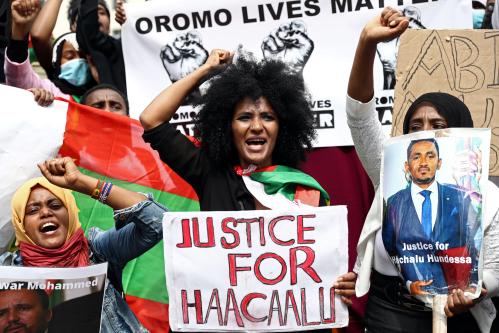
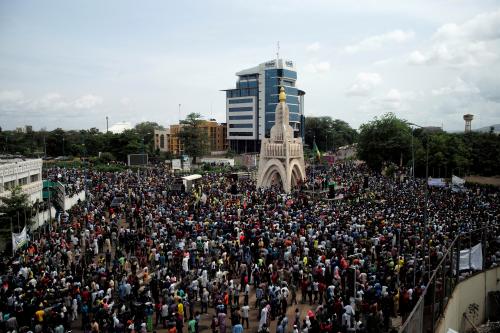
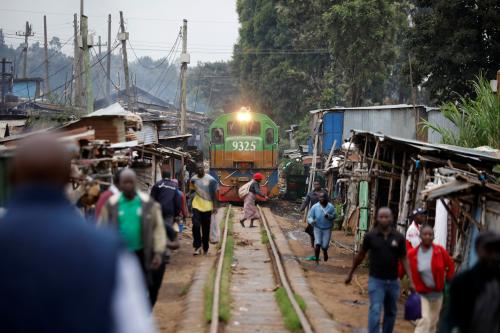

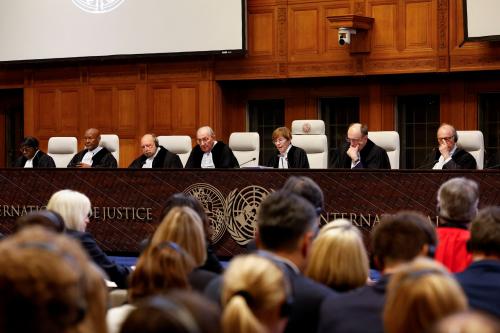
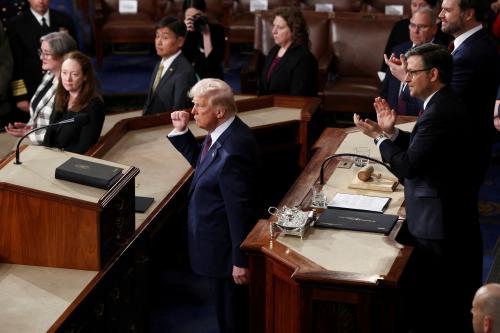

Commentary
Africa in the news: Election updates, Ethiopia begins to fill the GERD, and Sudan’s democratic transition moves forward
July 25, 2020